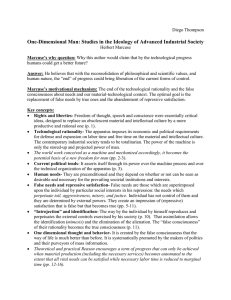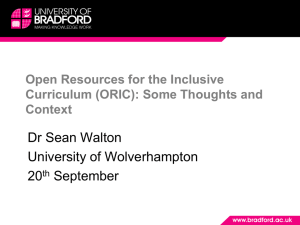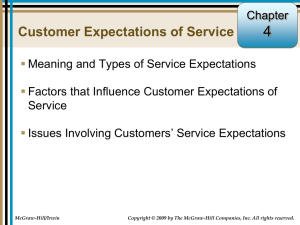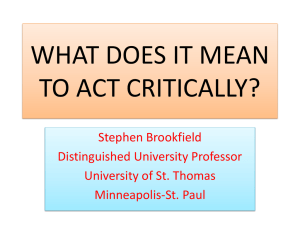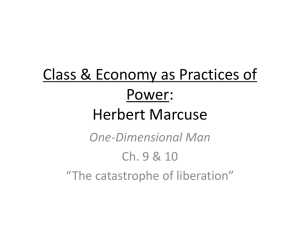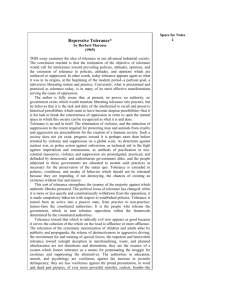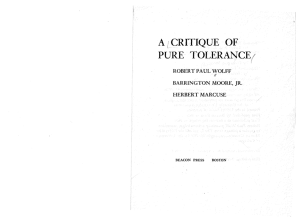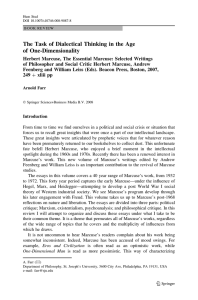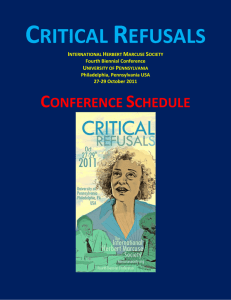Tolerance, critical faculties and false needs
advertisement
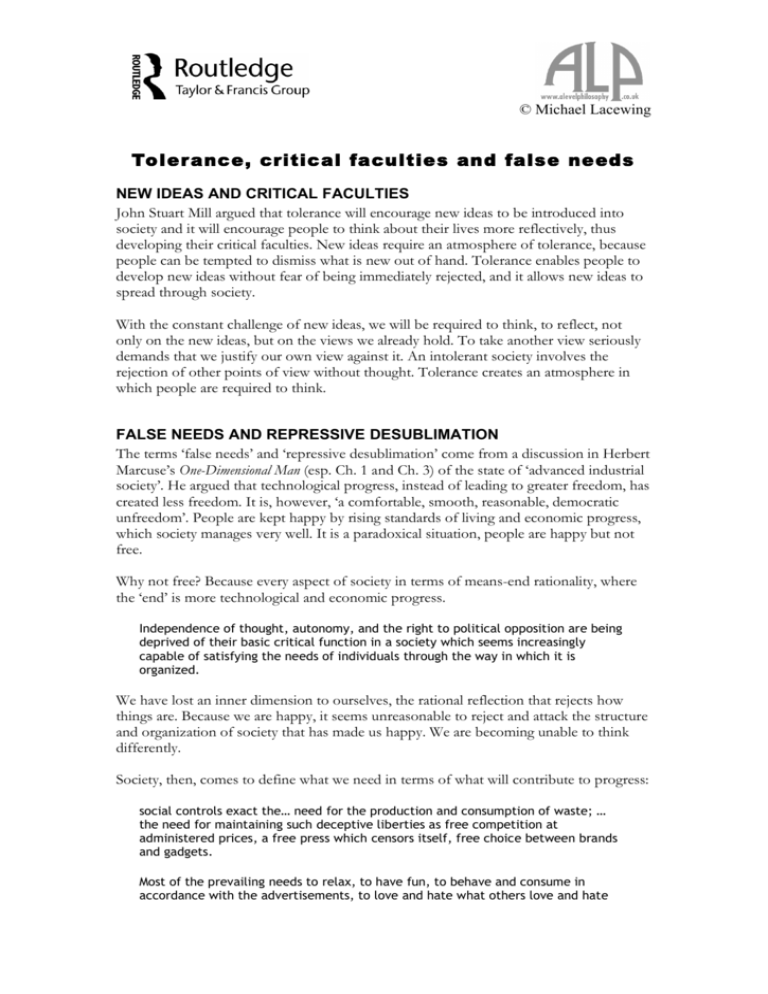
© Michael Lacewing To lerance, critical faculties and false needs NEW IDEAS AND CRITICAL FACULTIES John Stuart Mill argued that tolerance will encourage new ideas to be introduced into society and it will encourage people to think about their lives more reflectively, thus developing their critical faculties. New ideas require an atmosphere of tolerance, because people can be tempted to dismiss what is new out of hand. Tolerance enables people to develop new ideas without fear of being immediately rejected, and it allows new ideas to spread through society. With the constant challenge of new ideas, we will be required to think, to reflect, not only on the new ideas, but on the views we already hold. To take another view seriously demands that we justify our own view against it. An intolerant society involves the rejection of other points of view without thought. Tolerance creates an atmosphere in which people are required to think. FALSE NEEDS AND REPRESSIVE DESUBLIMATION The terms ‘false needs’ and ‘repressive desublimation’ come from a discussion in Herbert Marcuse’s One-Dimensional Man (esp. Ch. 1 and Ch. 3) of the state of ‘advanced industrial society’. He argued that technological progress, instead of leading to greater freedom, has created less freedom. It is, however, ‘a comfortable, smooth, reasonable, democratic unfreedom’. People are kept happy by rising standards of living and economic progress, which society manages very well. It is a paradoxical situation, people are happy but not free. Why not free? Because every aspect of society in terms of means-end rationality, where the ‘end’ is more technological and economic progress. Independence of thought, autonomy, and the right to political opposition are being deprived of their basic critical function in a society which seems increasingly capable of satisfying the needs of individuals through the way in which it is organized. We have lost an inner dimension to ourselves, the rational reflection that rejects how things are. Because we are happy, it seems unreasonable to reject and attack the structure and organization of society that has made us happy. We are becoming unable to think differently. Society, then, comes to define what we need in terms of what will contribute to progress: social controls exact the… need for the production and consumption of waste; … the need for maintaining such deceptive liberties as free competition at administered prices, a free press which censors itself, free choice between brands and gadgets. Most of the prevailing needs to relax, to have fun, to behave and consume in accordance with the advertisements, to love and hate what others love and hate are false needs. We feel we need these things, but the sense of needing them is a product of a society seeking only technological and economic progress. Repressive desublimation As a result, there are so few ‘experiments of living’ that really seek to strike out; those that do – that look ‘dangerous’ or really ‘different’ – are held up as images to be consumed, not as challenges to the system of consumption. Mass communication blends art, politics, religion and philosophy with commercials. Everything becomes a commodity, and this deprives it of its meaning as an alternative to the life of consumption. Higher culture was critical of society, alien, opposite, transcendent. So it drew our attention to what society was not, to other possibilities for how to find meaning in life. This made us unhappy, but we were conscious of the gap between reality and possibility. The gap was bad, but the consciousness was good and necessary for social change. Now we don’t understand higher culture in this challenging way, but as a taste or image, something to be bought and sold, discarded as the fashion passes. Its truth has been replaced by technological, economic, means-end rationality. We don’t see it as an alternative to this way of thinking, as an argument for some things being valuable for their own sake. We have lost our consciousness of how things might be different. Despite this, we have become more satisfied. Marcuse calls this ‘repressive desublimation’. (His theory draws on the ideas of Sigmund Freud.) ‘Higher’ culture derives its motivation and its energy, according to Freud and Marcuse, from our drives, in particular our sexual drives. Because it is socially unacceptable to have sex wherever, however, whenever we want, this energy is redirected into forms of creativity. The frustration, however, emerges once again in the challenge to society from higher culture. So in sublimation, we remain conscious of society’s repression of our drives. As higher culture has become commodified, we have gained more satisfaction, both from technological and economic progress, but also sexually. Sexuality is much more free, more daring and uninhibited than it used to be, but also, therefore, much more limited – it expresses itself just as sex, not as creativity. This is ‘desublimation’, but it is still repressive, creating false needs and undermining our ability to think. The system makes us happy, why conduct an ‘experiment in living’? The satisfaction we get weakens the rationality of protesting against society. Tolerance How does tolerance fit into all this? In fact, at no point does Marcuse say that tolerance contributes to the problem. The system may, however, generate something we may mistake for tolerance. As society absorbs all the challenges to it, what emerges is ‘a harmonizing pluralism, where the most contradictory works and truths peacefully coexist in indifference’. Peaceful coexistence sounds like tolerance, but technological progress has produced indifference: Everyone signs up to economic progress, jobs, some form of capitalism; what does it matter what else they think? This is not tolerance, but the inability to take seriously critical challenges to society. So a genuinely tolerant society – one in which autonomy is encouraged, real difference can flourish, many lifestyles are genuinely possible – will not create false needs and repressive desublimation. Perhaps our society is not genuinely tolerant, but an imitation, a fake. I think Mill would sympathise with much of this, as he too wanted to free thought and action from the tyranny of public opinion. Despite Mill’s argument from diversity, says Marcuse, ‘Under the conditions of a rising standard of living, non-conformity with the system itself appears to be socially useless’. We need to find new forms of freedom, freedom from the economy, freedom from politics we can’t control, freedom of thought from the influence of mass communication, the abolition of ‘public opinion’.
